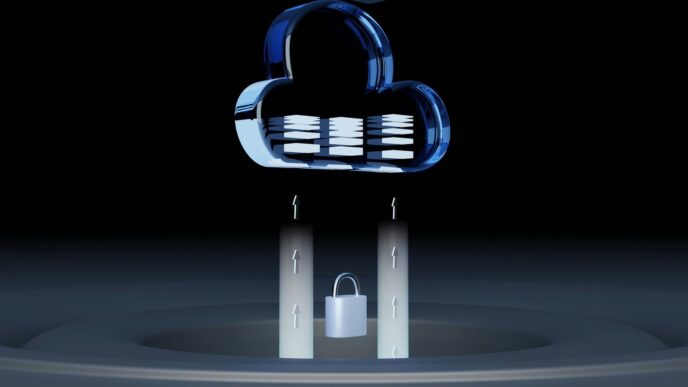Getting a sexploitation email can be really unsettling. These messages are designed to shock and pressure you, often by threatening to release private information. It’s important to know how to handle these situations to protect yourself. This guide will walk you through what to do, how to report it, and how to avoid future problems.
Key Takeaways
- Understand that a sexploitation email is a form of digital blackmail, often using threats and manipulation.
- Never reply to a sexploitation email; engagement can worsen the situation.
- Save the email and any related messages as evidence for reporting.
- Report the incident to law enforcement and your email provider.
- Strengthen your online security and stay aware of common scam tactics.
Understanding the Sexploitation Email Threat
What Constitutes a Sexploitation Email?
So, what exactly are these emails we’re talking about? Basically, a "sexploitation" email is a message designed to shock, embarrass, or blackmail you using sexually explicit content. It’s not just about receiving something you didn’t ask for; it’s about the intent behind it. These emails often contain explicit images or videos, sometimes claiming to be of you, or they might threaten to release compromising material they claim to possess. The goal is usually to get you to pay money, click a malicious link, or download an attachment. The core of the threat lies in the manipulation of your fear and shame. They prey on the idea that you’d do anything to prevent certain content from becoming public, whether it’s real or fabricated.
Recognizing the Tactics Used
Scammers are pretty creative, and they use a variety of tricks to make these emails seem convincing. You might see demands for payment in cryptocurrency, like Bitcoin, because it’s harder to trace. They often use a tone that’s both threatening and urgent, pushing you to act fast before you can think clearly. Sometimes, they’ll personalize the email by using your name or other details they might have found online, making it seem like they really do have something on you. They might also include fake links that look like they go to legitimate services but actually lead to malware or phishing sites. It’s a whole production designed to look real, even when it’s not. They might even claim to have hacked your device and recorded you through your webcam, which is a common, though often untrue, scare tactic.
The Psychological Impact of Sexploitation Emails
Getting one of these emails can be really unsettling. It’s natural to feel a mix of fear, anxiety, and even shame, especially if the email seems to target something personal. The thought of private or embarrassing content being exposed can be incredibly stressful. This emotional turmoil is exactly what the scammers are counting on. They want you to feel panicked and isolated, making you more likely to comply with their demands without questioning them. It’s a form of psychological warfare, aiming to exploit your vulnerabilities. Dealing with this kind of threat can take a toll, and it’s important to remember that you’re not alone and there are steps you can take to protect yourself and seek help. Remember, the initial shock is often the hardest part, but understanding the tactics can help you regain control. If you’re concerned about online privacy, understanding how to protect your digital footprint is key, and resources on website security can offer valuable insights.
Immediate Actions to Take
So, you’ve gotten one of those nasty emails. It’s a shock, and your first instinct might be to react, but hold on a second. What you do right after getting a sextortion email can make a big difference.
Do Not Engage or Respond
Seriously, don’t reply. Don’t click any links, don’t download any attachments, and definitely don’t send any money. Responding in any way, even to tell them to stop, signals to the sender that your email address is active and that you’re a potential target. They might see this as an invitation to escalate their demands or try other tactics. It’s like feeding a stray animal; you might think you’re helping, but you’re just encouraging them to stick around. Keep your digital doors firmly shut.
Preserve Evidence of the Sexploitation Email
Before you do anything else, save the email. Don’t delete it. You’ll want to keep the original message, including the full headers. These headers contain technical information about where the email came from, which can be really useful if you decide to report it. You can usually find an option like "View original" or "Show headers" within your email client. Think of it like collecting clues at a crime scene. This information is vital if you need to involve law enforcement or other agencies. You can also take screenshots of the email and any related messages or websites they might have directed you to. This documentation is key for any future actions you might take, like reporting negative SEO tactics if your online presence is affected.
Secure Your Devices and Accounts
This is a big one. If the sender is trying to extort you, they might have already found a way into your digital life, or they might be trying to. It’s a good idea to change the passwords for your email account and any other important online accounts, especially if you reuse passwords. Use strong, unique passwords for each service. Consider enabling two-factor authentication (2FA) wherever possible. This adds an extra layer of security, usually requiring a code from your phone in addition to your password. Also, run a scan on your computer and other devices with reputable antivirus software to check for any malware or spyware that might have been installed. Keeping your software updated is also a good habit to get into.
Reporting and Seeking Support

So, you’ve gotten one of those nasty exploitation emails. It’s a rotten feeling, and you might not know where to turn next. Don’t just sit there stewing, though. There are steps you can take to report it and get help.
First off, reporting these kinds of emails is super important. It helps authorities track down the people doing this and can prevent others from becoming victims. Think of it as your civic duty in the digital world.
Here’s a breakdown of who you should tell:
- Law Enforcement: This is probably the most serious step. Depending on the severity and nature of the email, you might want to contact your local police department or even federal agencies like the FBI. They have specific divisions that handle cybercrime and online extortion. It might feel like a hassle, but it’s often the most effective way to get these criminals caught.
- Your Internet Service Provider (ISP): Your ISP can also be a resource. They have ways to track the origin of emails and can sometimes block malicious senders. It’s a good idea to let them know what’s happening, especially if the emails are persistent or disruptive.
- Anti-Phishing and Cybersecurity Organizations: There are groups out there dedicated to fighting online scams and phishing attempts. Reporting the email to them helps them build databases of threats and warn others. Some well-known organizations include the Anti-Phishing Working Group (APWG) and the National Cyber Security Alliance (NCSA). You can usually find reporting tools on their websites.
Don’t underestimate the power of reporting; it’s a vital step in combating these digital predators. It might seem like a small action, but collectively, these reports make a big difference. If you’re unsure about how to report something, many cybersecurity websites offer guides and resources. For instance, understanding how to secure your online presence is a good start, and you can find tips on choosing a dependable web hosting service if you run a website yourself [62c7]. Taking these actions can help protect not only yourself but also the wider online community.
Preventative Measures Against Future Attacks
It’s easy to feel like you’re a target after getting hit with a sexploitation email, but there are definitely things you can do to make yourself a much harder mark for these scammers. Think of it like reinforcing your digital home.
Strengthening Email Security Practices
First off, let’s talk about your email account itself. Make sure you’re using a strong, unique password for your email. Don’t reuse passwords across different sites; if one gets compromised, they all could be. Enabling two-factor authentication (2FA) is also a big deal. This means even if someone gets your password, they still need a second piece of information, usually a code sent to your phone, to log in. It’s a really solid extra layer of protection. Also, be mindful of what information you share publicly online, as scammers can use this to make their threats seem more convincing.
Educating Yourself on Online Scams
Staying informed is your best defense. Scammers are always changing their tactics, so knowing what to look out for is key. They often try to create a sense of urgency or fear, which is exactly what happened in your case. Be suspicious of any email that asks for personal information, threatens you, or seems too good to be true. Websites that offer tips on identifying phishing attempts can be really helpful. Understanding the common tricks they use, like impersonating legitimate companies or using emotional manipulation, can help you spot them from a mile away. It’s like learning the tells of a poker player; once you see them, you know what’s up.
Utilizing Advanced Security Software
Beyond basic antivirus, consider using more robust security software. Many security suites offer features like advanced spam filters that can catch suspicious emails before they even hit your inbox. Some also include identity theft protection services, which can monitor your personal information for any signs of misuse. Regularly updating your operating system and all your software is also important, as these updates often patch security vulnerabilities that attackers could exploit. Think of it as keeping your digital locks in good repair. For more on how cybercrime evolves, you can check out resources on cybercrime threats.
Navigating the Aftermath of a Sexploitation Email
Okay, so you’ve gotten one of those awful sexploitation emails. It’s a really rotten feeling, and honestly, it can mess with your head. What do you do after the initial shock wears off? It’s not just about deleting the email and hoping it goes away. There are steps you can take to deal with the fallout and protect yourself moving forward.
Managing Personal and Digital Reputation
This is a big one. If the scammer managed to get any personal information or, worse, any images or videos, they might try to use it to damage your reputation. It’s important to remember that you are the victim here. The scammer is the one doing something wrong.
- Don’t panic. Scammers often rely on victims being too embarrassed or scared to act. Take a deep breath.
- Review your online presence. See what information is publicly available about you. You might want to adjust privacy settings on social media.
- Be prepared to explain (if necessary). If the situation escalates and your reputation is genuinely threatened, you might need to calmly and factually explain to trusted friends, family, or colleagues that you were targeted by a scam. Stick to the facts and avoid oversharing.
Seeking Emotional and Psychological Support
Getting an email like this can be really upsetting. It’s totally normal to feel anxious, violated, or even ashamed, even though you’ve done nothing wrong. Don’t try to tough it out alone.
- Talk to someone you trust. A friend, family member, or partner can offer a listening ear and support.
- Consider professional help. Therapists or counselors are trained to help people deal with trauma and stress. They can provide coping strategies.
- Look for support groups. Sometimes connecting with others who have gone through similar experiences can be comforting.
Understanding Legal Recourse Options
While it might feel like there’s not much you can do, there are legal avenues, especially if the scammer is identified or if specific laws were broken.
- Report to law enforcement: As mentioned before, reporting to the police or relevant authorities is key. If they can identify the perpetrator, legal action might follow.
- Civil action: In some cases, if you’ve suffered financial loss or significant emotional distress due to the scammer’s actions, you might be able to pursue a civil lawsuit. This is often complex and may require legal counsel.
- Consult a lawyer: If you’re unsure about your options or if the situation is particularly severe, speaking with a lawyer who specializes in cybercrime or privacy law can help you understand what legal steps might be available to you.
Wrapping Up: Staying Safe Online
So, if you ever find yourself on the receiving end of one of these nasty emails, remember you’re not alone and there are steps you can take. Don’t panic, don’t click anything, and definitely don’t pay up. Reporting it is key, whether it’s to your email provider or even the authorities if you feel it’s serious enough. Staying informed and being cautious about what you share online is your best defense. Keep your wits about you, and you can help keep these scams from working.
Frequently Asked Questions
What exactly is a sexploitation email?
A sexploitation email is a scam where someone tries to trick you by using sexually suggestive content or threats. They might pretend to have embarrassing videos or photos of you and demand money or personal information to keep them private. It’s all a fake attempt to scare you into giving them something.
What should I do if I get one of these emails?
The most important thing is to not reply to the email at all. Don’t click on any links or download any attachments either. These are designed to trick you. Just ignore it and delete it. It’s also a good idea to report it to your email provider.
Can they really do what they say they will?
Usually, no. These scammers often make up stories and threats. They don’t actually have any compromising material of you. They rely on you being scared and not knowing what to do. By not responding, you take away their power.
Should I tell anyone if I receive a sexploitation email?
Yes, it’s a good idea to tell a trusted adult, like a parent, teacher, or counselor. You can also report the email to your internet service provider or organizations that fight online scams. This helps them track these scams and protect others.
How can I protect myself from these emails in the future?
Be careful about what information you share online. Use strong, unique passwords for your accounts and enable two-factor authentication when possible. Keep your devices updated with the latest security software, and always be suspicious of emails asking for personal details or money.
What if I accidentally clicked on a link or replied?
If you accidentally clicked a link, immediately run a virus scan on your device. If you replied or gave out information, change your passwords for important accounts right away and monitor them for any suspicious activity. Let a trusted adult know what happened so they can help you.














